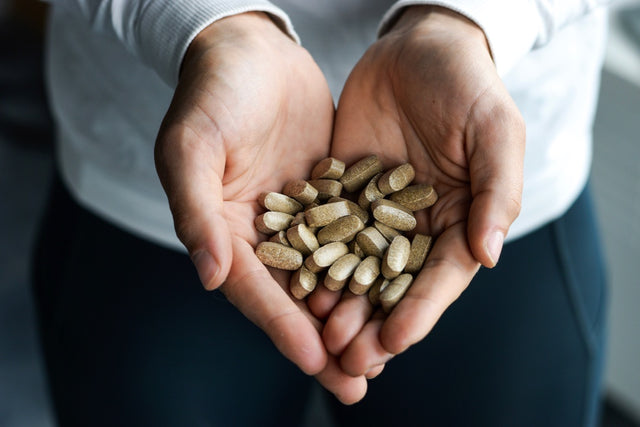When winter hits, it doesn’t just bring long, dark, gloomy days full of snow and frigid temperatures. It can also be the start of seasonal affective disorder, or what’s commonly known as the winter blues. Seasonal Affective Disorder (SAD) affects over 30 million people in the U.S. population alone and is often characterized by changes in mood, causing stretches of depression, increased pessimism, melancholy, lethargy and lack of motivation. So what do you do? You can’t change the weather, and the irrefutable patterns of the season. One popular method for treating winter blues, is Vitamin D. But the question is, does it actually work?
What Is Seasonal Affective Disorder (SAD)?
Seasonal Affective Disorder is a recurring major depressive disorder that affects a large majority of the population, with a seasonal pattern beginning in fall and continuing throughout the winter months. Those at an even larger risk are young adolescent females and those that live in cloudy colder climates, where it gets darker earlier. Yes, we’re talking about you Pacific Northwest [R].
People with SAD have difficulty regulating the neurotransmitter serotonin, which is believed to be responsible for balancing mood [R]. Those with SAD may also have difficulty with the overproduction of melatonin. Melatonin is a hormone that responds to darkness and causes sleepiness [R]. As the winter days become shorter and darker, melatonin production increases, making you feel sleepy and lethargic [R].
This combination of decreased serotonin and increased melatonin can impact circadian rhythms or the body’s internal 24-hour clock [R]. Circadian rhythm is synchronized to respond to the rhythmic light-dark changes that occur daily and throughout each of the seasons. For people with SAD, the circadian signal that indicates a seasonal change in day length has been found to be timed differently, thus making it more difficult for their bodies to adjust
Is Vitamin D Good For The Winter Blues?
While the exact cause of SAD is unknown, numerous studies suggest that it could be due to a lack of sunlight which can lead to lower serotonin levels and increased melatonin, which helps regulate mood, sleep, circadian rhythm.
A randomized controlled study published in The Journal Of Nutrition Health And Aging administered a group of 15 subjects with Vitamin D supplementation or phototherapy. After one month, all subjects receiving Vitamin D improved in all measured outcomes relating to mood and depression measures [R].
Vitamin D3 supplementation is an easy and inexpensive way to help relieve symptoms of SAD. A systematic review and meta-analysis concluded that low vitamin d levels are associated with depression [R]. Those living in colder climates are not able to synthesize adequate levels of vitamin d from the sun. 90% of our vitamin D comes from our skin's exposure to the sun, however, during the fall and winter months, the sun's ultraviolet light is not strong enough to synthesize the amounts we need. Supplementing with Vitamin D, especially during the winter months, may help protect you against the symptoms of SAD, in addition to protecting bone and muscle health.
Are you exhibiting symptoms of depression, irritability, changes in mood, and lack of motivation? Do you also live in a cloudy, cold weather climate? Vitamin D3 could be exactly what you need to improve your mood and get you feeling more like yourself.
Swolverine's VITAMIN D3 is proven to help improve immune system function, enhance mood state, and also optimize bone and muscle tissue health. Vitamin D3 is the clinical dose of sunshine you need to help you get through those long winter days.
SWOLVERINE is an endurance athlete and active lifestyle brand. Made for the elite athlete, and the strong-willed our products were designed to fuel your athletic performance. We perform when you perform.
We believe that everyone can optimize not only their athletic performance but their human potential. The way we believe we can optimize performance is through transparency, clinically effective doses, and clinically proven ingredients with evidence-based outcomes. We provide the nutrients you need to power your active lifestyle.
References
Gloth FM, Alam W, Hollis B. Vitamin D vs broad spectrum phototherapy in the treatment of seasonal affective disorder. J Nutr Health Aging. 1999;3(1):5-7.
Melrose, Sherri. “Seasonal Affective Disorder: An Overview of Assessment and Treatment Approaches.” Depression research and treatment vol. 2015 (2015): 178564. doi:10.1155/2015/178564
McMahon B., Andersen S., Madsen M., et al. P.1.i.037 Patients with seasonal affective disorder show seasonal fluctuations in their cerebral serotonin transporter binding. European Neuropsychopharmacology. 2014;24(supplement 2):p. S319. doi: 10.1016/s0924-977x(14)70506-1. [CrossRef] [Google Scholar]
Lewy A. J., Lefler B. J., Emens J. S., Bauer V. K. The circadian basis of winter depression. Proceedings of the National Academy of Sciences of the United States of America. 2006;103(19):7414–7419. doi: 10.1073/pnas.0602425103. [PMC free article] [PubMed] [CrossRef] [Google Scholar]
Miller A. L. Epidemiology, etiology, and natural treatment of seasonal affective disorder. Alternative Medicine Review. 2005;10(1):5–13. [PubMed] [Google Scholar]
National Health Service. Seasonal Affective Disorder—Symptoms. United Kingdom Government website, http://www.nhs.uk/Conditions/Seasonal-affective-disorder/Pages/Symptoms.aspx.
Rosenthal N. E., Sack D. A., Jacobsen F. M., et al. Melatonin in seasonal affective disorder and phototherapy. Journal of Neural Transmission. 1986;(supplement 21):257–267. [PubMed] [Google Scholar]
Murray G., Michalak E. E., Levitt A. J., et al. Therapeutic mechanism in seasonal affective disorder: do fluoxetine and light operate through advancing circadian phase? Chronobiology International. 2005;22(5):937–943. doi: 10.1080/07420520500263292. [PubMed] [CrossRef] [Google Scholar]
Teicher M. H., Glod C. A., Magnus E., et al. Circadian rest-activity disturbances in seasonal affective disorder. Archives of General Psychiatry. 1997;54(2):124–130. doi: 10.1001/archpsyc.1997.01830140034007. [PubMed] [CrossRef] [Google Scholar]
Wehr T. A., Duncan W. C., Jr., Sher L., et al. A circadian signal of change of season in patients with seasonal affective disorder. Archives of General Psychiatry. 2001;58(12):1108–1114. doi: 10.1001/archpsyc.58.12.1108. [PubMed] [CrossRef] [Google Scholar]
Anglin R., Samaan Z., Walter S., McDonald S. Vitamin D deficiency and depression in adults: systematic review and meta-analysis. British Journal of Psychiatry. 2013;202(2):100–107. doi: 10.1192/bjp.bp.111.106666. [PubMed] [CrossRef] [Google Scholar]














